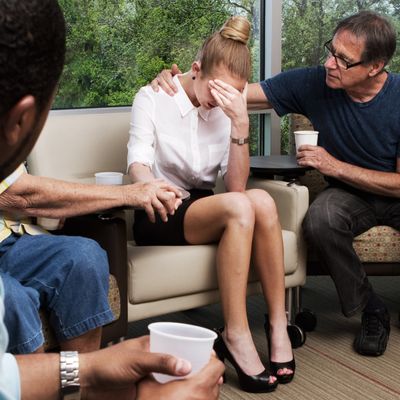
Love is a drug. That’s why we’re all here, isn’t it? It’s also why getting over an ex can feel like kicking heroin: intense cravings, the desperate need to use, the isolation and obsession. But what differentiates a “normal” sad-and-missing-my-ex situation from self-diagnosing as an “Exaholic”? It’s a term that sounds ripped from an SNL skit, but in fact, Exaholics have a fast-growing online support group with a 12-step program, a team of prestigious mental-health experts, and a daily affirmation that counts the days since “last initiating contact.” We asked Dr. Lisa Bobby, clinical director of Growing Self Counseling & Life Coaching in Denver, Colorado, and spokesperson for Exaholics, to explain the Exaholic community.
Is Exaholic a new term?
It’s a wonderful, new term, but we didn’t make up the phenomenon. Relationships tend to have an addictive quality, and research backs that up. It’s been demonstrated that romantic love activates the same region of the brain as cocaine and alcohol. In other words, “the brain on love” looks similar to “the brain on drugs.” And “the brain coming off love” looks a lot like “the brain coming off drugs.” With Exaholics, the theory is that falling in love is an addictive process, and that the process of getting over a relationship is similar to that of recovering from an addiction.
What are the similar symptoms?
After a breakup, much like a drug or an alcohol detox, there are often intense cravings for proximity or contact with the ex. Exaholics want to “use,” and “using” for an Exaholic means getting in touch with an ex, looking them up on social media, wanting information about them … When someone has any contact with their ex, positive or negative, they are “feeding the monkey.” And despite the fact that the new contact often makes them feel worse, they still have a compulsion to do it.
How do you know if you’re an Exaholic or if you’re just going through a bad breakup?
Breakups are hard for everyone, but those who can simply accept the loss and grieve the relationship are going to heal much faster than those who can’t even accept that grieving is in order. The Exaholic has unrequited hope, which often isn’t based on reality, and he/she is paralyzed by intense cravings to contact, be in close proximity to, or get information about their ex. They often feel “obsessed” by thoughts about their ex, and it impacts their ability to function at the same level.
Are Exaholics really in danger?
There is very little support for those suffering through a bad breakup, when in fact it’s deeply traumatic. People can suffer tremendously and experience significant consequences in their lives if they are unable to recover from a failed relationship. Untreated, an Exaholic can suffer consequences like losing a job, disruption of other relationships, weight loss or gain, health problems, unhealthy sleep patterns, substance abuse, and even suicidal ideation.
What can you ask yourself to determine if you’re an Exaholic?
Everyone grieves the loss of a relationship, and while you’re grieving, you’re not going to feel well. But an Exaholic isn’t grieving; they’re stuck in the purgatory of obsessive longing. So an Exaholic will have trouble with concentration, depressed mood, lack of interest in activities, diminished work productivity, and strained friendships post breakup — usually for an extended period of time. So ask yourself if you’re struggling with these things, and if your life feels far less fulfilling than the life you had before the breakup. But mostly: Have you accepted the fact that the relationship is over — that it’s dead?
Dead is a strong word.
That’s where the need for acceptance comes in. The loss of a relationship can be vague, compared to a loss like a death, but it’s no less traumatic for some. It’s especially hard to accept the loss if you see your ex alive and well on Facebook, or they are three blocks away from you, or, worst-case scenario, they’ve given you false hope by blaming it on timing or “my issues, not yours.” Exaholics need to accept that the relationship is no longer a living organism; they need to put it to rest. Then they can grieve and rebuild.
When we stalk our exes on social media, are we just looking for more pain? Why does that feel so good yet so bad?
This goes back to the addictive power of a relationship. Addicts know they are hurting themselves, too. Addicts know they are self-sabotaging. Drug addicts, they know it’s going to end badly. Yet these compulsions are very powerful. You always feel worse after stalking an ex, but it’s motivated by hope. Maybe the person is missing you. Maybe they’ll text you back? You want that contact, that rush, that signal. It’s biological, too — having any contact at all, seeing a picture, or reading a text, it gives you a surge of endorphins. And often, a hangover, in the form of new anxiety or pain.
Why are some people plagued by Exaholism and some not?
It depends on a few factors: (1) personal resilience — being able to tolerate the pain of grief; (2) the quality of other relationships in your life; and (3) an inherent sense of self-worth. There are some people who can look at a breakup objectively and say, “Look, we just weren’t a good match,” and there are others who say, “I’m unworthy of love.”
How similar is your 12-step program to AA?
I’d say we are a cousin in that we are spiritually close, but there are major differences. We don’t use God as our higher power. Members put their faith into the group. Also, alcoholics are alcoholics for the rest of their lives, and you’re probably not going to be an Exaholic for the rest of your life.
Can you summarize the steps to recovery?
The first steps of healing are accepting the loss, grieving it, and shifting the attachment from their ex to — temporarily — the Exaholic community. From there, it’s a self-discovery process: How did I get here and what do I have to do to feel better? There’s a lot of working through the emotions, the sadness, and sometimes even the guilt. We suggest that Exaholics count the days since last initiating contact — members declare their count. Each day of “sobriety” in not initiating contact is a victory; it’s a confidence builder.
How do you know you’re recovered?
When your ex becomes a person you used to know, as opposed to a source of throbbing and aching nonstop pain. But truly, you know you’ve recovered when you’re actually glad this happened to you because of the life lessons and opportunity for personal evolution the experience provided you with.
Should a recovered Exaholic tell a potential new partner that they’ve been “in treatment” for this?
There’s no need to label ourselves with new people. For a healed Exaholic, they’ll be able to look back and say, “I went through a bad breakup and it’s over.”





